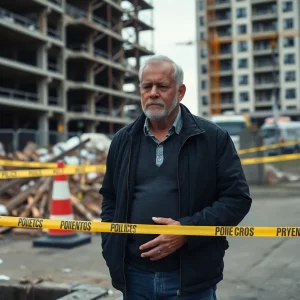Atlanta’s “Cop City” Project Stirs Up Heated Debates and Public Protests
Atlanta has recently become the scene of fervent protests and discussions surrounding the controversial “Cop City” project. The debate reached a boiling point at a city council meeting earlier this week, where tensions were high and voices were louder.
During the meeting, some constituents demonstrated their discontent by throwing ping pong balls and chanting “You dropped the ball!” This eruption of frustration highlighted the growing divide among the city’s residents regarding a proposed police training facility.
A Turbulent City Council Meeting
At the heart of the controversy is whether the new police training facility is a necessity or a misstep. This was a topic recently discussed on a local morning show, featuring an interview with Atlanta Councilman Michael Julian Bond. Mr. Bond elaborated on the council’s reactions to the public uproar and the immediate steps taken in response to the protests. However, his comments sparked additional concerns among the listeners, particularly within the context of the already contentious “Cop City” movement.
As a supporter of the project, Mr. Bond argued that the new facility is essential to replace the city’s aging police and fire training infrastructure, which he described as being in “gross disrepair.” He stressed the need for modernized training environments to recruit and retain public safety personnel, noting a nationwide shortage in law enforcement.
Community Concerns and Calls for Transparency
On the other side of the debate, Ms. Siyanda represents those who oppose the “Cop City” project. She voiced concerns that the facility could disproportionately impact marginalized communities, particularly within the Black community. Ms. Siyanda has labeled the project as part of a larger trend of increasing militarization in policing.
Her worries are echoed by a significant portion of Atlanta’s population; over 116,000 citizens signed a petition calling for a referendum on the project. However, Ms. Siyanda criticized the city clerk’s refusal to validate these signatures, suggesting that it undermined public participation in decision-making processes affecting their community.
Divided Opinions on Public Safety
The discussion between Mr. Bond and Ms. Siyanda highlighted the complexity and the deeply-rooted divide in Atlanta regarding the balance between public safety and community trust. While Mr. Bond emphasized the importance of having safe, state-of-the-art training facilities to ensure quality service and operational effectiveness, Ms. Siyanda insisted on the need for transparency and democratic participation in such significant community matters.
Mr. Bond acknowledged the importance of public discourse but reiterated that the new facility is a crucial step for enhancing the public safety services in Atlanta. Both sides showed a commitment to the well-being of Atlanta residents, though their methods and end goals differ significantly.
A City at a Crossroads
The debate over “Cop City” has put Atlanta at a crossroads. On one hand, there’s a push for improved public safety infrastructure, deemed necessary for the city’s future. On the other hand, there’s a call for more transparency, public input, and consideration of how such projects impact various communities within the city.
The recent protests and passionate debates only underline the need for a careful, balanced approach to this issue. As the city moves forward, the voices of all its residents will play a critical role in shaping the future of public safety and community trust in Atlanta.







